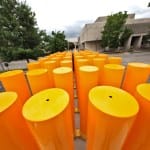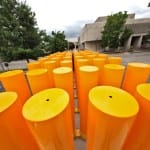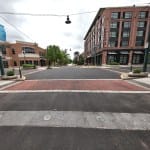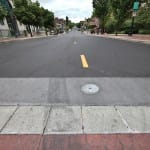Bloomington looks to relax regulations on businesses to aid recovery from COVID-19 impact




From now at least through Sept. 30, Bloomington businesses will be given a break on application fees for new signs, and on compliance with certain code requirements on signage.
In addition to that, restaurants and retail stores along Kirkwood Avenue will be able to expand their outdoor seating and marketing to take up more of the sidewalk than would normally be allowed. That’s just in connection with a planned trial street closure on the weekend of June 19.
According to Alex Crowley, director of the city’s economic and sustainability department, the relaxation of code requirements is part of the city’s effort to help the business community recover from the impacts of the COVID-19 pandemic.
Final approval of one package of proposals is scheduled for the June l7 city council meeting.
At Wednesday’s city council meeting, Crowley sketched out the three phases to recovery that a mayor-appointed economic stabilization and recovery working group has identified: rapid response; re-opening; and long-term revitalization.
The rapid response phase includes the use of food and beverage tax proceeds to give loans—about $1 million so far—to tourism-related businesses inside the city limits.
The relaxation of code requirements fits into the re-opening phase, Crowley said.
Crowley and Bloomington’s legal department has now put aspects of its intended relaxation of local code requirements in front of three different city bodies: plan commission, board of public works; and the city council.
On Monday, the plan commission voted its approval of a temporary waiver (through Sept. 30) of sign permit application fees. The normal fees are $75 per application for a permanent sign and $125 per application for permanent signs.
It’s something allowed under a provision of the unified development ordinance (UDO), which says that the plan commission can waive the application fee for any proposal that is “actively being promoted by a unit of local government or quasi-public organization or that involves a local subsidy.”
On Tuesday, the board of public works voted to approve a different procedure for application for additional sidewalk space to be used by restaurants and retail establishments along Kirkwood Avenue. A single application will be made by the Kirkwood Community Association on behalf of participating businesses.
The board of public works approval is continent on passage of a related ordinance by the city council, which got a first reading on Wednesday night and some discussion at a subsequent meeting of the council’s standing sustainable development committee.
The ordinance that the city council is being asked to consider is getting a first and second reading in front of the city council as required for any ordinance, but it doesn’t enact a change to the part of city code to which it relates, which is Title 20.
Responding to a question from The Square Beacon, city attorney Mike Rouker said the procedure for changing Title 20 is more “intense” than for changing other parts of the code.
A Title 20 change would require the council to take up the question at a meeting and refer the matter to the plan commission. The plan commission would have 60 days to make a recommendation on the proposed amendment to the city council, which would then have 90 days to follow the plan commission’s recommendation or not, Rouker said.
A couple of the “whereas” clauses of the ordinance seem to presuppose that the administration will be taking the intended steps:
WHEREAS, the City possesses discretion to not enforce portions of its Municipal Code during these extraordinary times and would like to make clear to all affected persons and businesses which local regulations WILL NOT be enforced; and
WHEREAS, for a temporary period of time, as described below, the City will be relaxing and/or waiving certain formalities related to sign regulations in order to facilitate a recovery for the local business community;
Is the ordinance necessary in order for the administration to take its proposed action? What if the the city council were to vote down the ordinance on a 0–9 tally?
Responding to a question from The Square Beacon, Rouker said: “We wouldn’t defy the Council if the Council voted against temporarily relaxing these requirements. We take our responsibility to enforce the City Code very seriously.”
Some of the relaxed code requirements involve how close to each other sandwich-board signs can be placed. About the idea that someone could litigate to require the city to enforce the affected code—for example, in the context of an ADA requirement—Rouker said none of the relaxed of code requirements would violate the ADA.
Rouker said he believes any court action, to try to make the city enforce those ordinances that it’s planning to temporarily relax, would fail, provided that the Council passes the ordinance.
Asked by councilmember Matt Flaherty during Wednesday’s committee meeting if the discretion to relax code requirements is tied to the unusual circumstances of the COVID-19 pandemic, Rouker said he does not believe it is. Rocker said some people might disagree, but his opinion is that the city could exercise its discretion to not to enforce code at any time. He also said that the city would be hesitant to relax code enforcement of Title 20, without the support of the city council.
Responding to a Square Beacon question about the need for an ordinance, as opposed to a simple council resolution, Rouker indicated that the uniqueness of the situation calls for the first- and second-reading process that’s required for an ordinance. That process contrasts with the one for resolutions, which are typically approved on the same night they’re introduced.
The timeframe for the temporary relaxation of code requirements could go past Sept. 30. Committee member Steve Volan said he was thinking about introducing an amendment at next Wednesday’s council meeting, when the ordinance will be heard at second reading. Volan’s contemplated amendment could extend the time to Nov. 30. Volan said he wanted to be sure that the the fall leaf season is incorporated, and preferred not to make the administration come back and ask for an extension.




Comments ()